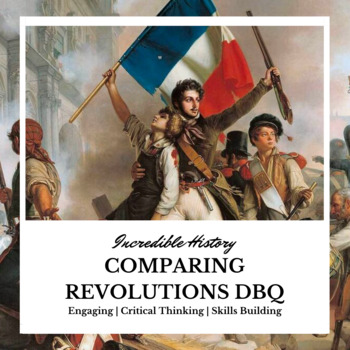Comparing Global Revolutions of the 18th and 19th Centuries
- Google Docs™

Description
This is a complete DBQ (document-based question exercise) on the topic of GLOBAL REVOLUTIONS. This DBQ includes clear instructions, ample historical context, seven documents/sources, and a detailed rubric.
This DBQ asks students to consider the following question: Did the revolutionary ideas and the reasons for revolution in England, America, France, Haiti, and Latin America have similarities to one another? Students will analyze and evaluate historical sources by a variety of authors, both primary and secondary. The sources include images, as well as maps. And, the documents have been abridged for a high school-level audience.
The document is in a Google Doc format, which means that you are able to easily edit the document to personalize it in order to fit the needs of your students. students can input their notes as they analyze each document, too.
I love engaging my students with DBQs. Why? Students assume the role of a historian and build critical 21st century skills, such as close reading, contextualization, critical thinking and analysis, writing, argumentative, and many other skills. It is a great preparation for college-level courses. Allow your students to reach their own conclusions about history based on their reading of historical evidence!
**DBQs also work great as formative and summative assessments** They are an important part of the AP history curriculum, as well.
I've come to really appreciate the flexibility that DBQs provide. In the past, I've used the sources in the DBQs for socratic seminars, gallery walks, argument towers (google this!), and debates.
GIVE IT A TRY TODAY. I'VE USED IT IN THE PAST WITH MUCH SUCCESS. I KNOW YOU WILL LOVE IT.
Historical Context:
The English overthrew their king, James II, in 1688 and replaced him with a new king who would recognize an increase in citizen rights by signing the English Bill of Rights. This event, known as the Glorious Revolution, was justified by John Locke in his Two Treatise on Government (1689), and as a result, Locke is considered the father of the Enlightenment, a philosophical movement that inspired people to question their government and rulers. These Enlightenment ideals were demonstrated through a series of political revolutions in the 18th and 19th centuries in America, France, Haiti, and Latin America, and the success or failure of these revolutions may depend on their goals and the causes for which they fought.





